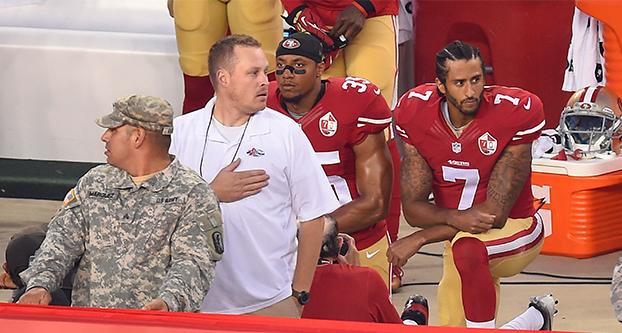Before a preseason game last month, San Francisco 49ers’ quarterback Colin Kaepernick refused to stand during the national anthem.
His decision to sit during “The Star-Spangled Banner” did not go unnoticed, but instead became media wildfire; lifelong fans of the Bay Area football team were posting videos burning the jersey of the once-promising fan favorite and are now instead denouncing him publicly on social media outlets like Twitter, Instagram and Facebook.
Kaepernick cited his reasoning for sitting out the anthem as a form of silent protest for the racial inequalities stemming from recent episodes of police brutality and the Black Lives Matter movement. Kaepernick released a statement, saying, “I’m going to continue to stand with the people that are being oppressed. To me, this is something that has to change. When there’s significant change and I feel that flag represents what it’s supposed to represent and this country is representing people the way that it’s supposed to, I’ll stand.”
Soon after Kaepernick’s act of protest, his teammates began to join him. On Sept. 1, 49ers’ safety Eric Reid took a knee alongside the quarterback, and it was from that point on that more and more professional football players, be it the Seahawks or Broncos, joined in the silent protest of our nation’s anthem. It wasn’t until last Sunday, the 15th anniversary of the 9/11 terrorist attacks, that the largest set of players took a knee during the anthem.
People’s anger at these small acts of protest baffle me. I don’t understand how one can be faithful to a team and decide that because one player chooses to express his political or social opinions, he becomes subject to jersey burnings and public crucifixions via social media.
In the last two years, 15 NFL players were arrested for acts of domestic violence. While some arrests were extremely controversial and crossed over into mainstream media, such as Ray Rice’s February 2014 domestic violence indictment and Adrian Peterson’s September 2014 child abuse charges, I saw no one denouncing the Baltimore Ravens, or publicly shaming the Minnesota Vikings. I saw no one burning jerseys with Rice’s name emblazoned on its back. Instead, I saw dedicated fans continuing to root for teams with abusers.
The only difference between then and now is that instead of turning a blind eye to domestic violence, football fans and other critics of Kaepernick and his colleagues are turning a blind eye to the blatant racism and police brutality happening every single day all over our country, from sea to shining sea. Why are Americans so quick to turn a blind eye to human inequalities, but then dub choosing to take a knee during the national anthem as unpatriotic?
If you think that Kaepernick’s act of silent protest is unpatriotic but look past the more than a dozen professional football players charged with domestic violence as recently as two years back, take an inventory of what’s really important.

